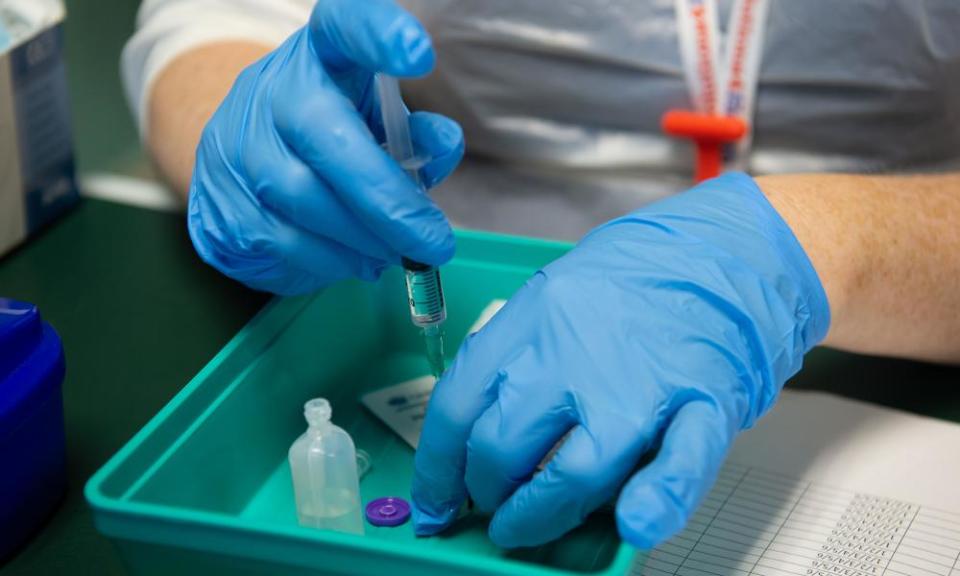South African scientists explore vaccines’ effectiveness against Omicron

Crucial work will study how well current jabs work and whether they need to be updated to tackle new variant
Scientists in South Africa have begun crucial work to assess how well Covid vaccines hold up against the Omicron variant that has been detected in more than a dozen countries since it was formally reported last week.
The variant carries dozens of mutations that are expected to change how the virus behaves, including its ability to cause infection and how well it can hide from immune defences primed by vaccines or previous infection with an older variant.
Related: UK science advisers brace for hundreds of confirmed Omicron Covid cases
Antibodies protect against viruses by gumming them up and preventing them from infecting human cells. To do so, they must recognise particular parts of the virus. Most Covid antibodies latch on to one of three sites on the virus, but all are mutated in Omicron, meaning antibodies produced by vaccines or past infection may be significantly less effective.
Prof Penny Moore at the University of the Witwatersrand and the National Institute for Communicable Disease in South Africa said “pseudoviruses” – harmless, non-replicating viruses used to model coronavirus variants – will be engineered to carry Omicron’s mutations. These will then be exposed to antibody-carrying blood plasma from vaccinated people and those who have recovered from Covid infection to see if they neutralise the virus.
Her lab will assess the protection provided by the Oxford/AstraZeneca, Pfizer/BioNtech and Johnson & Johnson vaccines, while tests on plasma from recovered patients will help to shed light on the risk of reinfection with Omicron. Early reports from South Africa suggest that reinfections are more common with Omicron than the Delta variant, but far more data is needed to be sure.
Moore’s results, which could be available in the next two weeks, are expected to provide some of the first laboratory evidence on whether existing vaccines are sufficient to keep Omicron at bay, or whether manufacturers will need to produce an updated vaccine. But with Omicron carrying so many mutations, making the pseudoviruses is not straightforward. “It will take some time to introduce so many mutations,” Moore said.
Related: What does appearance of Omicron variant mean for the double-vaccinated?
Further work on vaccine protection is under way at the African Health Research Institute in Durban where Prof Alex Sigal, a virologist, is growing batches of live Omicron from people who became infected in the recent surge in Gauteng in South Africa. Once he has enough to work with, the variant will be tested against blood plasma from vaccinated people and those with some natural immunity after a Covid infection.
South African scientists were the first to report the Omicron variant to the World Health Organization on 24 November. At the time, the first known infection was on 9 November, but earlier infections may come to light as countries conduct thorough searches for cases, chiefly among travellers who recently returned from the region.
The work in South Africa is part of an urgent global effort to understand the threat posed by Omicron. Ravi Gupta, professor of clinical microbiology at the University of Cambridge, hopes to join the effort soon, first with pseudoviruses and then with live Omicron. Further experiments, he said, will look at how well synthetic antibody treatments deal with the variant. The therapies are crucial for patients who are not able to mount their own immune response to the virus.
Several vaccine manufacturers have also launched studies into how well the jabs protect against Omicron. AstraZeneca is analysing infections and vaccination status in people in Botswana and Eswatini on the borders of South Africa. Meanwhile, a spokesperson for Pfizer said the company hoped to have initial results from its own antibody studies “in the coming weeks”.
If the variant largely evades vaccines, both Moderna and Pfizer claim they can produce a new, tailor-made vaccine in about 100 days, subject to approval by regulators.

 Yahoo Movies
Yahoo Movies 